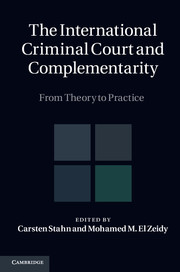Book contents
- Frontmatter
- Contents
- Acknowledgments
- Foreword by HE Judge Sang-Hyun Song
- Foreword by Patricia O’Brien
- Foreword by Silvia A. Fernandez de Gurmendi
- List of abbreviations
- Introduction: bridge over troubled waters?
- PART I General reflections
- PART II Origin and genesis of complementarity
- PART III Analytical dimensions of complementarity
- PART IV Interpretation and application
- 14 The application of the principle of complementarity to the decision of where to open an investigation
- 15 Situation and case: defining the parameters
- 16 The inaction controversy
- 17 The admissibility procedures
- 18 The evolution of the ICC jurisprudence on admissibility
- 19 Interpretative gravity under the Rome Statute
- 20 Complementarity and burden allocation
- PART IV (Continued) Interpretation and application
- PART V Complementarity in perspective
- PART VI Complementarity in practice
- Index
- References
15 - Situation and case: defining the parameters
from PART IV - Interpretation and application
Published online by Cambridge University Press: 05 November 2014
- Frontmatter
- Contents
- Acknowledgments
- Foreword by HE Judge Sang-Hyun Song
- Foreword by Patricia O’Brien
- Foreword by Silvia A. Fernandez de Gurmendi
- List of abbreviations
- Introduction: bridge over troubled waters?
- PART I General reflections
- PART II Origin and genesis of complementarity
- PART III Analytical dimensions of complementarity
- PART IV Interpretation and application
- 14 The application of the principle of complementarity to the decision of where to open an investigation
- 15 Situation and case: defining the parameters
- 16 The inaction controversy
- 17 The admissibility procedures
- 18 The evolution of the ICC jurisprudence on admissibility
- 19 Interpretative gravity under the Rome Statute
- 20 Complementarity and burden allocation
- PART IV (Continued) Interpretation and application
- PART V Complementarity in perspective
- PART VI Complementarity in practice
- Index
- References
Summary
The chapter seeks to unpack the meaning of a number of terms central to the operation of the ICC's complementarity regime, including ‘situation’, ‘case’, ‘investigation’ and ‘prosecution’; examines their application to various stages of the proceedings under Articles 17, 18 and 19 of the Rome Statute; and explores the intersection of complementarity with jurisdiction and gravity.
Introduction
As the International Criminal Court (ICC) establishes its early jurisprudence, a host of issues are starting to give form to the many concepts and terms contained in the Rome Statute. Much, however, remains undefined. The chapter considers the parameters of situations (temporal, territorial, personal, material); the specificity of the term ‘case’ for the purpose of admissibility; and the meaning of the terms ‘investigation’ and ‘prosecution’. It will examine the impact of these definitions on the different stages of the proceedings in order to explore the contours of the Court's admissibility provisions. To the extent that assumptions of complementarity are interwoven into the entire fabric of the Rome Statute, the chapter will also explore the intersection of complementarity with jurisdiction and gravity.
What is a situation?
The term ‘situation’ under the Rome Statute denotes the confines within which the Court determines whether there is a reasonable basis to initiate an investigation and the jurisdictional parameters of any ensuing investigation. As the drafting history reveals, the term was intended to frame in objective terms the theatre of investigations, thereby rejecting the idea that a referring body could limit the focus of the Prosecutor’s activities by reference to a particular conduct, suspect or party.
- Type
- Chapter
- Information
- The International Criminal Court and ComplementarityFrom Theory to Practice, pp. 421 - 459Publisher: Cambridge University PressPrint publication year: 2011
References
- 2
- Cited by



